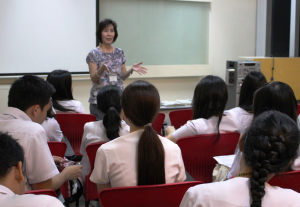
Educators have been in the front and center of online teaching since the beginning of lockdown, finding the balance between guiding students through the sudden transitions and facing what everyone else was facing — the effects of the COVID-19 pandemic.
To safeguard and promote the mental health of teachers with the impending return to school, listed down are five tips they can practice to allay their concerns about the new teaching situations:
1. Embrace life-giving attitudes
Practice self-kindness. Transitioning to a face-to-face setup tends to invite conscientious teachers to impose overly high standards on them and their students. Have a lot of grace for everyone involved including yourself.
It is helpful to avoid rigid perfectionism. Working hard and doing good work does not have to leave you feeling depleted and on edge. Instead of trying to be perfect, acknowledge that mistakes can be made and may even be helpful.
Practice radical acceptance:
- Accept that some students may lag behind in their studies so expect to provide support through reviewing the past subject matter
- Accept your emotionality as well as of your students
- Accept the psychological climate in our country
2. Anticipate and create positive experiences
Create opportunities where you can also experience reconnection and enhanced workplace wellbeing. You will be meeting students who are hungry for connections and meaningful learning experiences. You can spend time in the faculty lounge with colleagues.
When dealing with disturbing emotions, remember RAIN:
R – Recognize your feelings when you are being overwhelmed, uncertain, or struggling with the massive changes.
A – Accept them as part of your reality.
I – Interpret your experience.
Where is the emotion coming from?
What may be triggering such emotions?
What messages are they bringing to me, myself, others, and my situation?
Is this coming from a situation I can control or not control?
If there are actions required of you, proceed mindfully and focus on what you can control.
N – Non-identification: that sole experience does not define you.
3. Reimagine F2F work arrangement and make it work for you
Re-imagine your day, week, and month as you learn more about the nature of transition plan of your school. Accept that your schedules will change. Have a view of the week and month but also take it a day at a time.
- Plan for the small details of classroom management
- Get COVID-19 routines established early and be gently firm in enforcing them.
- Improve the ventilation of your faculty room where you may have to do occasional advising
- Try using a speaker when giving lectures to better project your voice while wearing a mask.
4. Engage in healthful behaviors
Make a new calendar consisting of activities that:
- Will enhance your teaching effectiveness
- Will help take care of yourself (self-care)
- Have given you a sense of calm, peace, and joy in the past
- Can allow you to express how you are currently feeling
5. Design a practical work-life balance
Family members can talk about their concerns and support one another’s work and/or study strategies. Parents and/or partners will have to cooperate on new arrangements including parenting responsibilities.
- Commit to giving due time for work and due time for family.
- Be flexible: Accept that there are days when more time is needed for work.
- Have regular hours for work, family, and self. If you can have at least 30 minutes to yourself, accept it and be grateful.
(This article, written by Anne Marie Alto, was first published in the UP Manila Website on May 22, 2022)
